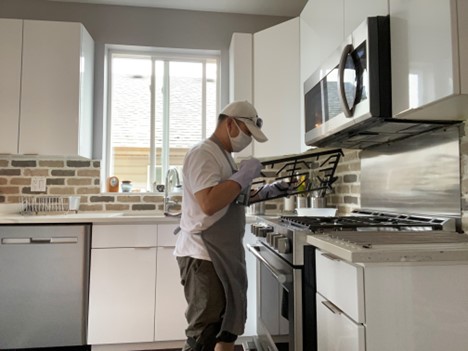“Because of My Hearing Aids, I’m Becoming a Stellar Employee”

Eliezar works as a residential cleaner in Victoria, cleaning homes.
He has hearing loss, which has made his job difficult due to miscommunications that have occurred. As well, being unable to hear alarms or emergencies put Eliezar at risk of injury.
The Island Deaf and Hard Of Hearing Centre referred Eliezar to WorkBC Assistive Technology Services for funding for a pair of hearing aids. He applied and was quickly approved.
WorkBC Assistive Technology Services Makes Remote Work Easier for Victoria

Victoria works as a business software specialist in Port Moody managing her company’s implementation of a customer relationship management (CRM) software. Her team has worked remotely since 2019 and she spends a significant amount of time conferencing through video and audio with colleagues on different continents.
She has had bilateral hearing loss since childhood, and audio-only conferences prevented her from lip reading or using other coping mechanisms to compensate for her hearing loss.
Victoria learned about WorkBC Assistive Technology Services through a family member who also has hearing loss, and decided to apply.
Peter Earns His First Client Thanks to New Hearing Aids

Peter is a mechanical designer based in Surrey, and is currently in the YMCA self employment program. He is looking for new clients and contract work as he works towards starting his own business.
Last year, Peter experienced significant hearing loss.
“It was very difficult for me to get a job because I could not even conduct an interview,” he shares.
Jason Increases His Productivity With WorkBC Assistive Technology Services

Jason is the founder of a small technology company in BC.
“I’m working remotely in a home office, and my duties require me to wear just about every hat in the company,” he shares.
“I have a repetitive strain injury. It makes it progressively more challenging to perform my work tasks and be productive during the day.”
Assistive Technology Helps Alice Work More Efficiently

Alice does important work as a Coordinator of the Youth Leadership Initiative (YLI) with the Disability Foundation.
The YLI is a research project that aims to identify attitudinal barriers to post-secondary youth with disabilities transitioning from studies to the workplace and produce solutions for youth and employers. Her many duties include creating marketing materials, writing funding reports, and coordinating new team members.
Alice is partially sighted and needs high contrast and good lighting to see.
New Hearing Aids Help Rod Stay On Top of His Business

Rod runs a business with his wife in Cranbrook.
“It is very important that we communicate well with each other and with our customers,” he says.
However, his hearing aids were over five years old, and he noticed he was making mistakes.
Mary Finds Relief With WorkBC Assistive Technology Services

Mary is a manager at an interior design and cleaning company in Kelowna that works with real estate companies.
An old fracture on her left ankle causes her pain, and makes her favour her right foot, which in turn causes her pain on her right side, affecting her shoulders, neck, and leg.
“Long periods of standing on my feet or heavy lifting bending down can cause discomfort which affects my ability to work,” she explains.
“I Was Just Blown Away,” Robert Receives Hearing Aids and Great Service from WorkBC Assistive Technology Services

To do his job as a delivery driver for a grocery store in Terrace, Robert needed hearing aids in working order. From listening to his GPS to know where he was headed for a delivery, to communicating with customers over the phone or behind doors when delivering to people with COVID, Robert needed to be able to hear.
“I did have hearing aids prior, but they were faulty, and I couldn’t use them,” he shares. “In fact, during my training, the trainer had to repeat constantly.”
He needed new hearing aids, and his wife had found out about WorkBC Assistive Technology Services online as way to help fund the hearing aids. He decided to apply and was quickly approved.
New Hearing Aids Help Kimberley Hear Customers on the Phone Easier

Kimberley works as a customer service agent in West Kelowna for an online health company.
She has high frequency hearing loss. She learned about WorkBC Assistive Technology Services from NexGen Hearing, and decided to apply.
With help from funding by WorkBC Assistive Technology Services, Kimberley was able to purchase a new pair of hearing aids.
“I’ve Gained My Confidence Back,” Douglas’ New Hearing Aids Make a Big Difference

Douglas works as a support worker at a treatment centre in Chilliwack. He has hearing loss and it was making it hard to do his job.
“Obviously, if I can’t hear my clients, I don’t have a job. And obviously, you lose the confidence of your clients, you lose confidence in yourself,” he shares. “I need to be able to hear people speak, and I need to be able to hear when we’re filling out intake forms — very important that I’m hearing the proper drugs they’re using.”



